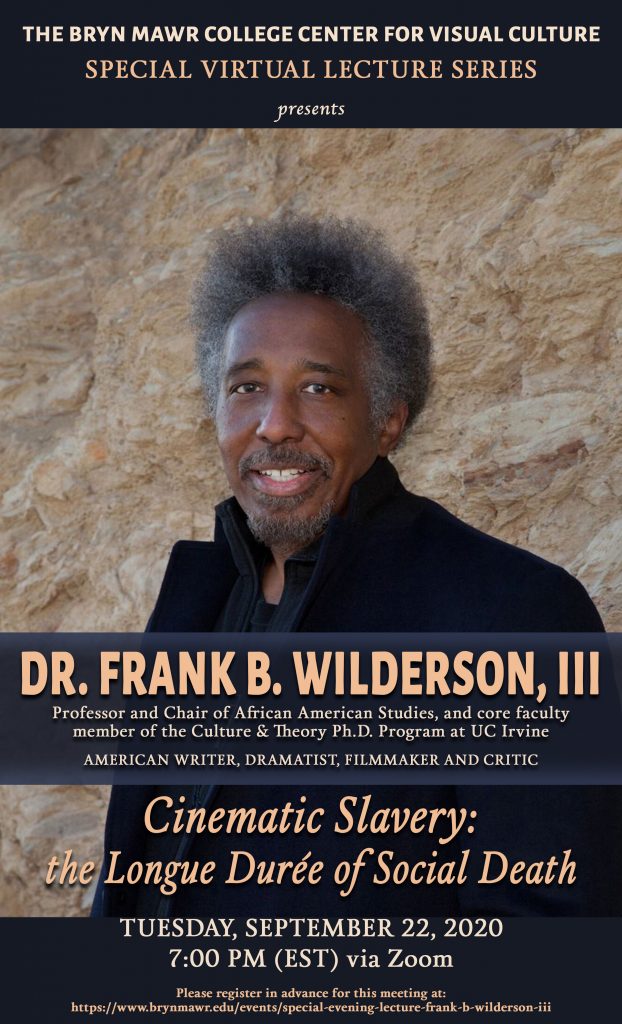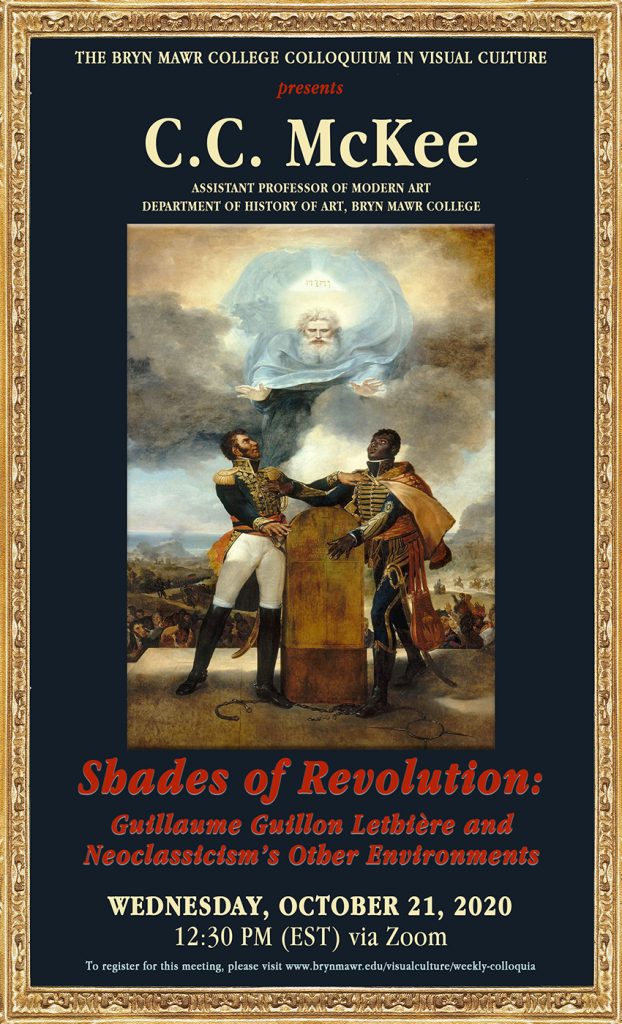Department of History of Art
Bryn Mawr College
Introduction to Fall Colloquium 2020
Category Archives: Events
September 22, 2020 – A Special Evening Lecture with Dr. Frank B. Wilderson, III
Professor and Chair of African American Studies
Core faculty member of the Culture & Theory Ph.D. Program at UC Irvine
American writer, dramatist, filmmaker and critic
Cinematic Slavery: the Longue Durée of Social Death
The antagonism between Blacks and Humans lurks beneath the surface of 12 Years a Slave (Steve McQueen, 2013). But in Manderlay (Lars von Trier, 2005) this antagonism avoids the pitfalls of disavowal that all too often characterize the signifying strategies of 12 Years a Slave and, by extension, public debates around race. At the core of this civic and cinematic disavowal, is the failure of discourse to remain in the hold of the ship; manifest in an inability or unwillingness to grapple with the difference between gratuitous violence, which elaborates and positions Black people, and contingent violence, which disciplines non-Black subalterns once those subalterns have been elaborated and positioned by discourse (the symbolic order).
7PM- EST
Suggested background films:
September 23, 2020 – Carrie Anderson
Assistant Professor
Department of History of Art and Architecture
Middlebury College
Textiles and Trade in the Dutch Atlantic World: Albert Eckhout’s African Man and Woman
Art historians have largely abandoned the notion that Dutch artist Albert Eckhout’s (1610-1665) series of so-called ethnographic portraits—today in the National Museum of Denmark—offer transparent portrayals of the people with whom the Dutch had contact in New Holland, the name given to the northeast region of Brazil during Dutch occupancy (1630-1654). Instead, scholars have more recently posited nuanced and careful critiques of these paintings that identify and challenge the Eurocentric assumptions and hierarchies integral to the conception and interpretation of the series. Acknowledging the critical importance of these studies, this talk seeks to reframe the parameters of the discussion by reestablishing the crucial connections between material culture and cultural identity—which are evident even when bound by the pictorial conventions of oppressive colonial forces. Drawing from global, material culture, and literary studies, this talk will focus on the blue-and-white textiles worn by Eckhout’s African figures, garments that gesture towards the complexities of Dutch global trade networks, but also make visible the complex negotiations that informed cultural identities in the early modern Atlantic world.
September 30, 2020 – Anthony Petro
Associate Professor of Religion and Women’s, Gender, and Sexuality Studies
Department of Religion
Boston University
Provoking Religion: The Aesthetics of Literalism and the Queer Arts of Myth in the U.S. Culture Wars
This talk begins with a simple enough question: when is a cross a cross, and when is it a gauntlet thrown in the infamous battles of the U.S. culture wars? How does an image come to offend, who does it offend, and why? During the height of the U.S. culture wars in the 1980s and 1990s, a number of conservative Christian leaders attacked art dealing with issues of religion, gender, and sexuality as pornographic or sacrilegious, if not specifically anti-Christian. Indeed, a number of artists, including Andres Serrano, Robert Mapplethorpe, Karen Finley, and David Wojnarowicz, drew upon aesthetic forms borrowed from the rich visual and ritual history of Christianity, and of Roman Catholicism specifically, often in ways that seemed to profane religious symbols. This talk focuses on the work of artist and author David Wojnarowicz and his legal battles of Christian Right leader Donald Wildmon to examine the contours of such debates. It asks how we might read such episodes not as typical culture wars battles pitting religious conservatives against secular progressives, but rather as competing struggles to define the place of religion and art in the public sphere.
October 5, 2020 – A Special Evening Lecture with Leigh Raiford
Associate Professor
Department of African American Studies
University of California, Berkeley
7-8:30 PM
EST
* Unless otherwise specified, this lecture will be recorded.
October 7, 2020 – Rachel Grace Newman
Assistant Professor of Art History
Tyler School of Art and Architecture
Temple University
Beyond the Veil: Buried Entities, Black Geographies, and the Camera Lucida in Colonial Jamaica
Jamaica in the early nineteenth century was a brutal world ruled by sugar and plantation enslavement. Watercolors by the British artist William Berryman give us a glimpse into the oft-forgotten spaces of that world, specifically, the provision ground – land enslaved people used to grow sustenance. This paper peels back the layers of Berryman’s scenes, asking us to look beyond what has been rendered visible by his hand. Using Katherine McKittrick’s theory of black geographies, I examine how those things we cannot see, those things that are literally buried in the ground, constructed alternate modes of power on plantations and enabled enslaved people to mark their earth as their own.
October 14, 2020 – Micki McElya
Professor of History
University of Connecticut
The Presenting Past: Slavery, Memory, and Reckoning
In June 2020, the Quaker Oats company (a subsidiary of PepsiCo) announced that it will retire the Aunt Jemima trademark, which it has owned since 1926. Informed by the national uprisings in the wake of George Floyd’s murder, the immediate reason was a widely circulating TikTok video lambasting the trademark’s racism. This presentation examines the history of the trademark from its origins in the late 1880s to its purported imminent demise to explore questions about the normalizing functions, murderous power, and resistant possibilities of visual culture.
October 21, 2020 – C.C. McKee
Assistant Professor of Modern Art
Department of History of Art
Bryn Mawr College
Shades of Revolution: Guillaume Guillon Lethière and Neoclassicism’s Other Environments
This presentation explores the neoclassical oeuvre of Guillaume Guillon Lethière—a mixed-race painter who was born in Guadeloupe and ascended to the heights of the French Academié in the early-nineteenth century. Taking up a body of works executed over the course of the French and Haitian Revolutions, this paper centers on the inclusion of Caribbean ecological markers in Lethière’s history paintings. From this perspective, Lethière’s oeuvre articulates a relationship to the Caribbean as an ecology of blackness counterintuitively represented through Classicism. This is an ecology in its broadest sense; it encapsulates not only the psychic machinations of an individual mixed-race artist, but also the diffusion of raced identity into the landscape itself, and the co-mingling of blackness and the botanical in an independent Haiti. Lethière and his painting practice are a distinct node at which multiple colonial dialectics converge: the tumultuous politics of Revolutionary France and Haiti, the liberatory political possibilities of the Classics and botany for black subjectivities, and the interpenetrating psychological and environmental ecologies that opened as much as they foreclosed for Lethière.
C.C. McKee is an Assistant Professor of Modern Art on the Emily Rauh Pulitzer ’55 Professorship in the Department of History of Art at Bryn Mawr College. McKee received a dual doctorate from Northwestern University and the École des hautes études en sciences sociales. In their current monographic project, McKee uses painting and scientific imagery to trace the coeval developments in colonial race and environmental sciences in the francophone Atlantic World. This project represents one facet of McKee’s broader investment in the relationship between colonialism and its continued effects in the present. These interests include, the art history of science in the Atlantic World, contemporary African and African diasporic art, and queer aesthetic practices. In addition to their scholarship, McKee has developed these perspectives in various pieces of art criticism; with exhibitions at the Block Museum, Iceberg Projects (Chicago, IL), and the Ghetto Biennale (Port-au-Prince, Haiti); as well as in an articles in Art Journal and CASVA Seminar Papers. McKee’s research and curatorial projects have been supported by a number of grants including the College Art Association Professional Development Fellowship.
* Unless otherwise specified, this lecture will be recorded.
November 4, 2020 – Paul Pfeiffer
Sculptor, photographer and video artist
Crowds and Power: Recent Experiments In Speculative Video Production and American Mass Ritual
* Unless otherwise specified, this lecture will be recorded.








